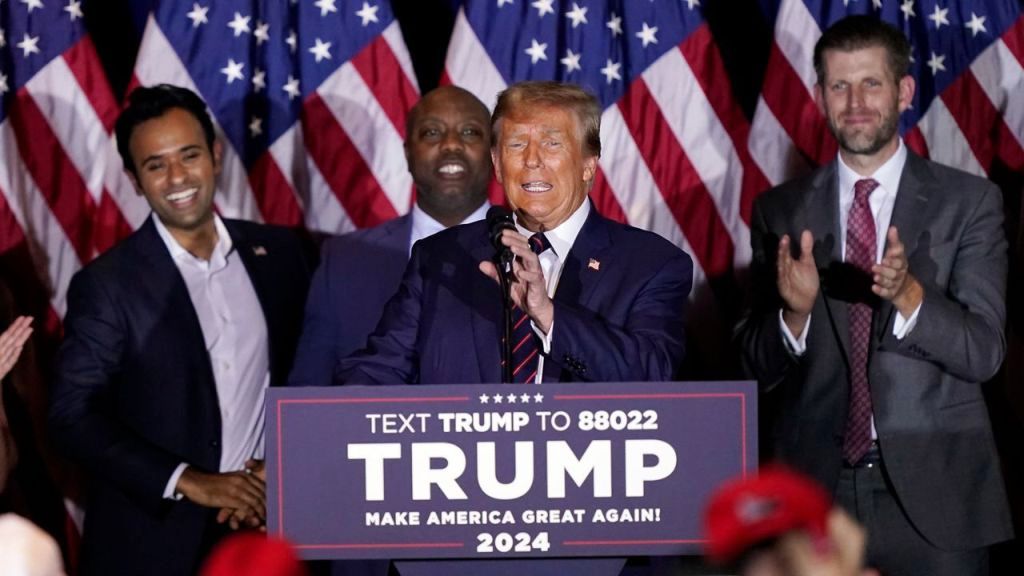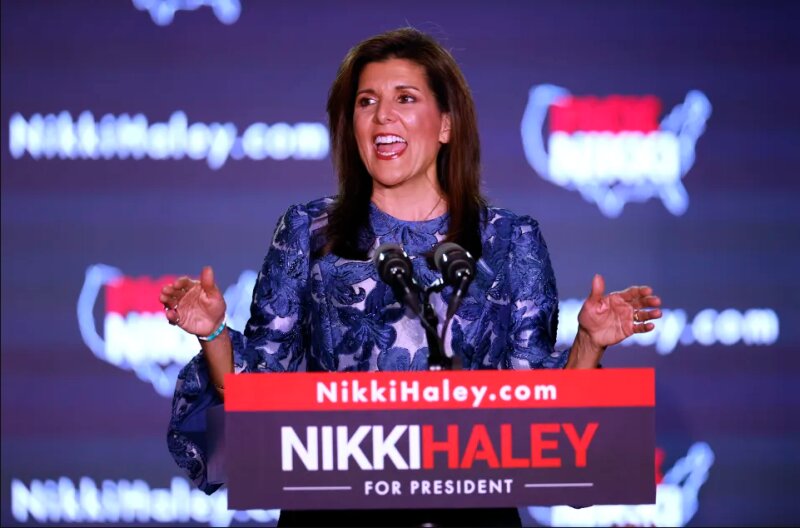
Trump beats Haley in New Hampshire, moves closer to Biden rematch. Former President Donald Trump won the New Hampshire primary on Tuesday, defeating his main rival, former South Carolina Gov. Nikki Haley, who had hoped to challenge him for the 2024 Republican nomination. The win brings Trump closer to a second face-off with President Biden in the general election.
The Associated Press declared Trump the winner at 8 p.m. EST, as soon as the polls closed. With more than 80% of the votes counted, Trump had 55% and Haley had 44%. AP said that Trump’s lead was too big to overcome, based on the remaining votes.
But Haley did not give up. In her speech, she said she got “close to half of the vote” and deserved to stay in the race. She also praised Trump and said he “earned” his win.
“We still have a lot to do, but we keep going up,” Haley said. “New Hampshire is the first state to vote. It is not the last state to vote. This race is not over. There are many more states to go.”
Trump was angry. In his speech, he lied and said Haley was a “fake” who pretended to win.
“Somebody came to the stage, looking nice,” he said, talking about Haley. “She did not win. She lost.”
But “I do not get very mad,” Trump said. “I get even.”
Trump’s win in New Hampshire followed his big win in Iowa last week. He won the Iowa caucuses by 30 points, forcing Florida Gov. Ron DeSantis, who came second, to quit the race and support Trump.
That left Haley, who used to work for Trump as the U.S. ambassador to the United Nations, as the only serious challenger to Trump. She wanted a “two-person race” in New Hampshire, where some polls showed her close to Trump. She thought she could win over independent voters and moderate Republicans who did not like Trump.
She also hoped that a strong showing in New Hampshire would help her in South Carolina, her home state, which votes next on Feb. 24. She wanted to have some momentum going into the next big contest.
But Haley did not do well enough in New Hampshire. Now it is unclear if she can compete with Trump in the other states, where he is more popular with Republicans. Some people wonder if she will drop out or keep running, in case Trump has legal trouble that hurts his campaign.
Haley had focused on New Hampshire for a long time. She thought it was the best place to beat Trump and stop him from getting his third GOP nomination in a row.
For a while, Trump did not have more than 50% in the New Hampshire polls, because there were many other candidates. But then Haley rose above the others. She did well in the debates and got the support of Chris Sununu, the popular Republican governor of New Hampshire. Some polls showed her with 40% or more.
Haley and her supporters spent a lot of money on ads in New Hampshire, about $30 million. That was twice as much as Trump and his supporters spent. Haley even joked that New Hampshire would “fix” the Iowa results.
But after DeSantis left the race, Trump and Haley attacked each other more. In the end, Trump won.
Here is a possible rewritten version of the article with a single heading:
How Trump Defeated Haley?
Former President Donald Trump won a decisive victory over former South Carolina Gov. Nikki Haley in the New Hampshire primary on Tuesday, eliminating her last chance to stop him from getting the 2024 Republican nomination and setting up a possible rematch with President Biden in the general election.
Trump used a “pincer” strategy to attack Haley from both sides, criticizing her for being soft on immigration and for wanting to raise the retirement age for social programs. He also showed his strength in the GOP by rallying with three former rivals who had endorsed him: South Carolina Sen. Tim Scott, North Dakota Gov. Doug Burgum and businessman Vivek Ramaswamy.
Haley tried to fight back by questioning Trump’s mental health and calling him and Biden “equally bad” for the country. But her message did not resonate with enough voters in New Hampshire, a state that she had hoped to win or at least come close.
According to exit polls, Haley won 60% of independent voters, who made up 43% of the electorate, but Trump won 74% of Republican voters, who were slightly more than half of the electorate. Haley also lost some of her potential supporters to Trump, who gained from the exit of Florida Gov. Ron DeSantis, who had been his closest competitor in Iowa.
DeSantis dropped out and endorsed Trump before New Hampshire, a move that may have been influenced by the fact that most of his backers preferred Trump over Haley as their second choice.
Haley vows to continue. Despite her defeat, Haley said she would not quit the race and would campaign in South Carolina, her home state, which votes next on Feb. 24. She said she had a $4 million ad campaign ready and would hold a rally in North Charleston, S.C., on Wednesday night.
“According to Haley, the state’s voters are looking for a vote, not a coronation as she addressed those who support her. And we’re gonna give them one.”
But the polls show that Haley faces a steep uphill battle in South Carolina and beyond. She trails Trump by 37 points in her home state and by even bigger margins in other key states such as Wisconsin, Ohio, Florida and Texas. Nationally, Trump leads Haley by 51 points, according to a Yahoo News/YouGov survey from mid-December.
Haley’s campaign manager said in a memo that the race would not be decided until Super Tuesday, March 5, when many states with open primaries vote. He urged everyone to “take a deep breath” until then.
But Trump’s campaign is confident that he has the nomination locked up. His next challenge is his federal trial for 2020 election interference, which starts on March 4.






